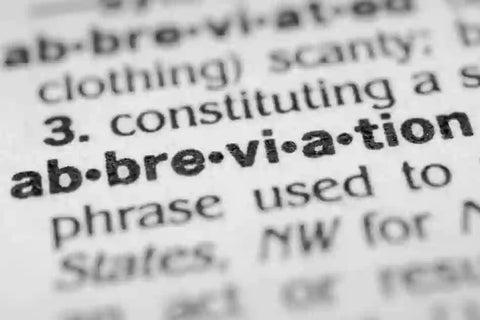The Appropriate Use of Articles before Abbreviations in Academic Papers
Abbreviations are basic tools for most authors of scholarly prose and are used with considerable frequency in scientific writing. They can quickly and effectively communicate concepts that would take several words to write out in full, and they are particularly useful when space is limited, as it often is in tables and figures. Abbreviations can make your writing clearer, more concise and less awkward, but only if they are use carefully and accurately.
Careful and accurate use obviously includes choosing the correct forms for standard abbreviations and devising sensible forms for newly created abbreviations, ensuring that each nonstandard abbreviation is clearly defined when it is first introduced and then used consistently throughout a document. However, abbreviations also need to be integrated into grammatically correct sentences in order to communicate effectively and act as functional elements of formal scholarly prose. When misused, abbreviations can be more awkward than the most unwieldy specialised phrases, and they can also prove extremely confusing for readers.
Essential to the effective use of abbreviations are the articles placed immediately before them. The definite article ‘the’ rarely presents challenges before abbreviations, but it is sometimes forgotten, perhaps because it is considered part of an abbreviation when it is not, so it is important to include it whenever necessary. For instance, ‘When NASA launches take place’ is fine as is, but in the singular an article is required: ‘When the NASA launch takes place.’ It is helpful to remember that acronyms (which are read as words) tend not to require preceding articles at all except when they are used adjectivally – ‘the patient was diagnosed with AIDS,’ but ‘the AIDS patient’ – whereas initialisms (which are pronounced as individual letters) tend to use a preceding article (whether definite or indefinite), as in ‘a CD,’ ‘an NGO’ and ‘the EU.’
When an indefinite article is needed immediately before an abbreviation, the pronunciation of the abbreviation determines whether ‘a’ or ‘an’ should be used. ‘A’ is the correct choice before abbreviations beginning with a consonant sound, including a vowel pronounced as a ‘w’ or ‘y’ sound. Examples include ‘a PhD,’ ‘a NASA launch’ and ‘a UNICEF greeting card.’ When an abbreviation begins with a vowel sound, however, including a consonant pronounced with an initial vowel sound, ‘an’ should be used instead, as in ‘an APA style of referencing,’ ‘an IQ test’ and ‘an MP’s riding.’
The correct use of articles before abbreviations is not only an aspect of accomplished writing, but it is also essential to clear communication, with the abbreviation ‘MS’ providing a good example. As an initialism, MS means ‘multiple sclerosis’ and is read as individual letters, so it should be used with ‘an’ when an indefinite article is required (an MS patient). However, MS can also mean ‘manuscript’ (or, more accurately, the Latin manuscriptum) and is pronounced as a word when read aloud, so it should be preceded by ‘a’ when an indefinite article is needed (a MS study). Confusing the two abbreviations through the inappropriate use of articles (as in ‘a MS patient’) may provide your reader with a laugh, but that is only desirable if it is also intended.
Why Our Editing and Proofreading Services?
At Proof-Reading-Service.com we offer the highest quality journal article editing, dissertation proofreading and online proofreading services via our large and extremely dedicated team of academic and scientific professionals. All of our proofreaders are native speakers of English who have earned their own postgraduate degrees, and their areas of specialisation cover such a wide range of disciplines that we are able to help our international clientele with research editing to improve and perfect all kinds of academic manuscripts for successful publication. Many of the carefully trained members of our manuscript editing and proofreading team work predominantly on articles intended for publication in scholarly journals, applying painstaking journal editing standards to ensure that the references and formatting used in each paper are in conformity with the journal’s instructions for authors and to correct any grammar, spelling, punctuation or simple typing errors. In this way, we enable our clients to report their research in the clear and accurate ways required to impress acquisitions proofreaders and achieve publication.
Our scientific proofreading services for the authors of a wide variety of scientific journal papers are especially popular, but we also offer manuscript proofreading services and have the experience and expertise to proofread and edit manuscripts in all scholarly disciplines, as well as beyond them. We have team members who specialise in medical proofreading services, and some of our experts dedicate their time exclusively to dissertation proofreading and manuscript proofreading, offering academics the opportunity to improve their use of formatting and language through the most exacting PhD thesis editing and journal article proofreading practices. Whether you are preparing a conference paper for presentation, polishing a progress report to share with colleagues, or facing the daunting task of editing and perfecting any kind of scholarly document for publication, a qualified member of our professional team can provide invaluable assistance and give you greater confidence in your written work.
If you are in the process of preparing an article for an academic or scientific journal, or planning one for the near future, you may well be interested in a new book, Guide to Journal Publication, which is available on our Tips and Advice on Publishing Research in Journals website.








